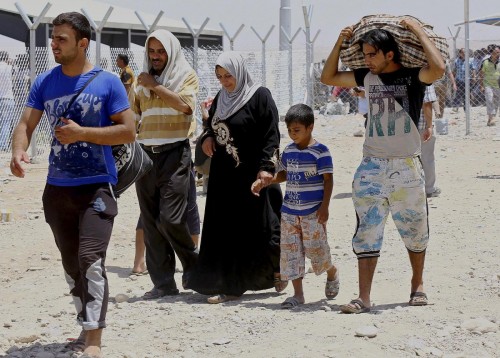
A little more than a decade ago, Mosul was home to 60,000 Christians who practiced their religion in the midst of their Muslim neighbors in Iraq’s second-largest city.
No more. Earlier this month, Muslim extremists who had captured the city ordered all Christians to convert to Islam, pay a tax or face execution. They later revoked the tax as an option.
The result has been a mass exodus of Christians to the semi-autonomous region of Kurdistan and laments that only Muslims are tolerated in the city today.
“It is no longer possible for Christians to live in Iraq,” said the wife of Raad Ghanem, one of 250 Christians who fled to the picturesque Mar Mattai Monastery atop this mountain, 12 miles from Mosul.
Ghanem’s wife, who did not want her name used because she worries about her safety, said that when she showed up one day at the hospital where she had worked for 30 years, she was told she wasn’t welcome anymore. “They told me I couldn’t work there because I am Christian,” she said. “I told them that I am from Mosul, that this is my home.”
To underscore that she and other Christians should not return, fighters from the al-Qaeda splinter group now known as the Islamic State, last week blew up a tomb believed to be the burial place of the biblical prophet Jonah, who survived in a whale’s belly.
On Monday, France’s interior and foreign ministers offered asylum to the fleeing Christians, who still have hope of remaining in their homeland.
Sipping tea at the monastery here, they recounted their frightening ordeal the night they were forced to flee. “The houses of Christians were specially marked with the Arabic letter “N,” meaning Christian,” said Nadia Nafik Ishaq, a woman with a broken leg.
“It was written that they were the property of the Islamic State. After that, all the properties were robbed. All our things were taken. What is the solution? How long will we have to be here?” Ishaq said.
“When we left in the middle of the night, we were stripped of everything. Money, wallets, jewelry, ID, passports, watches, everything,” Raad Ghanem said. “At the Daesh checkpoint on the way out of the city, my wife was even stripped of her earrings. They took everything of value we had.”
“They changed our church into a mosque, ruined historic museums and destroyed a monastery and manuscripts that were 1,000 years old. Iraq is gone. Iraq is finished. We’re finished. It’s impossible for us to go back,” he said.
In a small bedroom on the second level of the monastery, a disabled woman was stretched out uncomfortably with her wheelchair beside her as her sister described how they were among the last Christian families to flee the city.
“It was illegal for us to leave the house, so we knew it wasn’t going to end well,” Ikram Hama said. “Luckily a Christian soldier helped us, and we escaped late at night with just the clothes on our back.”
“Sick people, disabled people, poor people were all forced to leave. They killed my cousin after they looked at his ID,” she continued. “We have no money and my sister has a disability. There is no doctor here and no hospitals close by. We are in a bad situation. For us, Iraq is over.”
Twenty miles southeast of Mosul, the city of Qaraqosh has become a hub for Christians who fled the Islamic State fighters. But even it is unsafe. Although it is protected by Kurdish fighters, Islamist militants clashed with soldiers there in June, forcing thousands of Christians to flee to safer ground.
In an unfurnished townhouse still under construction on the outskirts of Qaraqosh, two families sat on the floor as they discussed the future of Iraq.
“I want to be a Christian but IS (Islamic State) took us to the mosque and tried to convert us to Islam,” said Flora Adwa, a mother of three.
She said the owner of the townhouse had allowed the two families to temporarily stay at the home.
“We gave them all our money, but then they took our car and our house,” she explained. “They told us that with the money we gave them we could go anywhere but Mosul. We cannot return. We are finished. What is our future?”
USA Today

Leave a Reply
You must be logged in to post a comment.